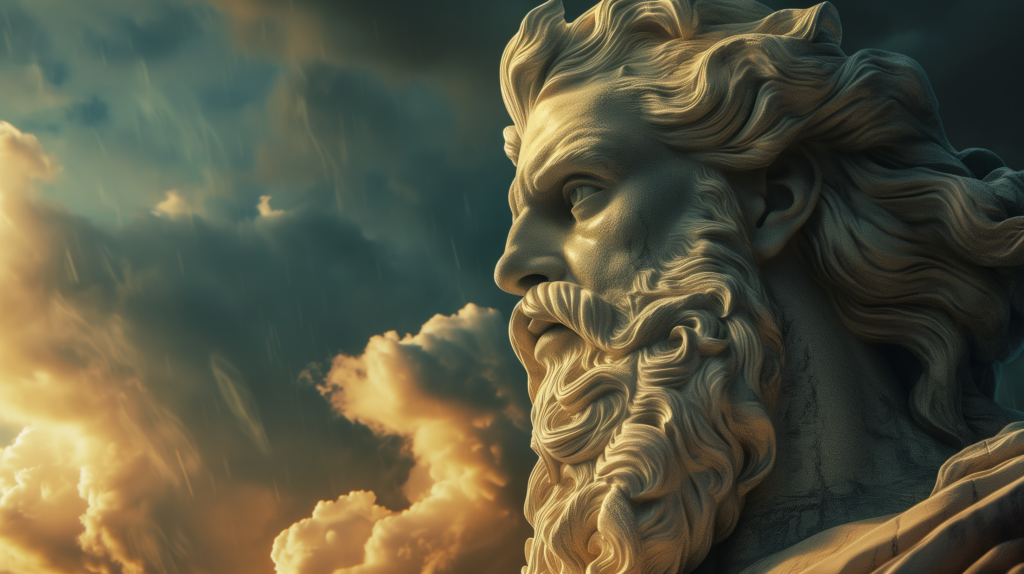
Stoicism, a philosophy that has stood the test of time, offers profound insights into the human condition, ethics, and our relationship with the universe. Its principles, developed in the Hellenistic period, continue to influence modern thinking and spirituality.
A frequently posed question about this rich tradition concerns its stance on divinity: Do Stoics believe in God? This article delves into the heart of Stoicism to explore its unique perspective on God, the universe, and where humans fit into this grand schema.
Understanding Stoicism
The Philosophy of Stoicism
At its core, Stoicism is a philosophy of personal ethics informed by its system of logic and its views on the natural world. Founded in Athens by Zeno of Citium, it teaches the development of self-control and fortitude as a means of overcoming destructive emotions.
Core Principles
Stoicism promotes living in accordance with nature and reason, emphasizing virtue as the highest good. It argues that a life well-lived is one that aligns with the rational order of the universe, embodying wisdom, courage, justice, and temperance.
Stoicism and the Natural World
For Stoics, the natural world is a web of interconnectedness, governed by a rational and divine logos. This logos, or universal reason, ensures the world operates in harmony, guiding Stoic understanding of ethics and morality.
The Stoic View on God
Pantheism in Stoicism
Central to Stoic theology is pantheism, the belief that God is equivalent to the universe and its natural laws. This view positions God not as a distinct, personal deity but as the rational, organizing principle of everything that exists.
The Concept of Logos
The logos in Stoicism is often equated with divine reason or the mind of God. It’s seen as the animating force that gives order and structure to the cosmos, indicating a universe imbued with purpose and intelligence.
The Stoic God and the Universe
For Stoics, God and the universe are inseparable, with the divine essence permeating all aspects of reality. This view fosters a profound sense of connectedness with the world and encourages an attitude of reverence towards life and nature.
Stoicism and Theism
The Differences
While traditional theism typically involves the worship of a personal, transcendent God, Stoicism offers a different outlook. It espouses an impersonal understanding of divinity, focused on the immanent laws and rational structure of the universe.
Stoicism vs Traditional Theism
Stoicism’s pantheistic view contrasts with the theistic perspective of a God who intervenes in the world. Stoics see the divine as present in all things, guiding the universe through natural laws rather than miraculous acts.
Personal God vs Impersonal Principle
Traditional religions often emphasize a personal relationship with God, whereas Stoicism views the divine as an impersonal principle. This principle governs the universe with wisdom and justice, influencing Stoic ethics and morality.
Modern Interpretations
Stoicism in the Modern World
Stoicism’s timeless principles have found new resonance in contemporary life, offering guidance on resilience, happiness, and ethical living. Its holistic view of the universe provides a framework for navigating the complexities of modern existence.
Relevance Today
The Stoic practice of focusing on what is within our control and accepting what isn’t has profound implications for personal well-being and societal harmony. It encourages a life of virtue, mindfulness, and compassion.
Modern Stoicism and Spirituality
While not religious in a traditional sense, modern Stoicism encompasses a spiritual dimension that aligns with various religious and philosophical traditions. It offers a way of life that values inner peace, ethical integrity, and a deep connection with the natural world.
Conclusion
Stoicism presents a compelling vision of divinity that is intricately woven into the fabric of the universe. While it may diverge from traditional theistic views, its pantheistic perspective enriches our understanding of the divine, offering a pathway to living in harmony with the cosmos.
As we navigate the challenges of the modern world, the wisdom of Stoicism remains a guiding light, illuminating the interconnectedness of all things and the enduring significance of virtue and reason.
FAQs
Q1: Do all Stoics believe in the same God?
A2: While Stoicism traditionally embraces a pantheistic view of God as synonymous with nature and reason, individual interpretations may vary.
Q2: How does Stoicism explain evil?
A2: Stoicism views evil as the result of ignorance or a lack of virtue. It teaches that understanding and aligning with the natural order can overcome destructive emotions and actions.
Q3: Can one be a Stoic and still follow a traditional religion?
A3: Yes, many people find that Stoic principles complement their religious beliefs, emphasizing virtue, ethical living, and the acceptance of things beyond one’s control.
Q4: How does Stoicism view the afterlife?
A4: Stoicism generally focuses on living a virtuous life in the present rather than the specifics of an afterlife. It teaches that the soul returns to the cosmic Logos, merging with the universal reason.
Q5: How can Stoicism apply to modern life?
A5: Stoicism provides tools for dealing with stress, adversity, and the pursuit of happiness. Its emphasis on virtue, resilience, and understanding what we can control offers valuable guidance for contemporary challenges.

